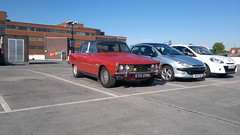Solemnity of the Annunciation of the Lord
(1st Profession of Religious Vows in the Society of Jesus)
Readings: Isaiah 7:10-14,8:10; Psalm 39(40):7-11; Hebrews 10:4-10; Luke 1:26-38
Picture: cc Simon Shek & EthelRedThePetrolHead
Picture: cc Simon Shek & EthelRedThePetrolHead
My dear friends, can you tell me the difference between a supermarket and a carpark? Of course, the differences are many. But I am thinking of one in particular. I’m thinking of what we look for in each of these things. What do you look for when you visit a supermarket? And what do you look for when you drive into a carpark? Have you ever noticed the difference between the two?
Usually, when I go to a supermarket, what I hope to find are shelves filled with goods. Many different kinds of goods. The greater the variety the better. Imagine how surprising, even alarming, it would be if I entered a supermarket only to find all the shelves empty… In contrast, when I drive into a carpark, what I hope to find is quite the opposite. What I’m looking for is not more and more stuff. But space. Well, at least one empty space. A safe place where I can park my car.
At supermarkets I look for stuff. But at carparks space. Strange as it may sound, sisters and brothers, this difference is not unlike what we find in our Mass readings today. On this Solemn Feast of the Annunciation of the Lord, as might be expected, the readings are all about how Christ comes to be conceived and born into the world. How the eternal Word becomes flesh, and dwells among us. How the Most-High Almighty God comes close to God’s people. Truly becomes Emmanuel, God-with-us.
For some reason, God chooses to do this by seeking the cooperation of human beings. By looking for a particular kind of human response. What does this response look like? The kind that allows Christ to be conceived and to be born into the world? The readings help us to ponder this question by presenting us with a striking contrast between two different kinds of response.
Echoing the responsorial psalm, the second reading describes this contrast in these words: You took no pleasure in holocausts or sacrifices for sin; then I said… ‘God, here I am! I am coming to obey your will.’ The contrast is between holocausts and sacrifices on the one hand, and presence and obedience on the other. You do not ask for sacrifice and offerings but an open ear. You do not ask for holocaust and victim. Instead, here am I. Rather than plenty of stuff offered up in sacrifice, God prefers instead simply an empty space. An open ear. A heart docile enough to listen to God’s word. A person humble enough to carry out God’s will. What God is looking for is not a supermarket. But a carpark. Not plenty of stuff. But simply a receptive space.
And what the psalm and the second reading describe in the abstract, the first reading and the gospel portray for us in more concrete terms. The contrast is between King Ahaz in the first reading, and the Virgin Mary, in the gospel. Ahaz is the king of Judah. A kingdom that is in imminent danger of being attacked by its neighbours, Syria and Israel. In this time of grave peril, God invites Ahaz to put his trust in God. To pray for a sign of God’s protection. But Ahaz refuses. Not so much because the king doesn’t want to test God. But because he has actually already made other plans. He has already decided to ally himself with the Assyrians. The king’s heart is so full of fear, and so full of his own desperately concocted schemes, that he is unable to put his trust in God. He is unable to receive the gracious assistance that God is offering him and his people. It’s as though, when the Vehicle of the Divine Presence arrives at Ahaz’s heart, it finds there no empty space. The carpark is full. As we might expect a supermarket to be full.
In the gospel, when the angel Gabriel visits Mary, she too is deeply disturbed by the angel’s words. She too does not understand how God’s plan could possibly be carried out. As a virgin, how is she to conceive and bear a human child? Let alone the Son of God? And yet, disturbed and confused though she may be, Mary somehow receives the grace to converse with the angel. And eventually to say yes to God. I am the handmaid of the Lord, let what you have said be done to me. What God finds in Mary is precisely what is lacking in Ahaz. An empty space. An open heart. An obedient will. This is what makes all the difference. This is how Christ comes to be conceived and born into the world. What it takes is not so much plenty of stuff. But simply a receptive space. Not a supermarket. But a carpark.
All of which might serve as a providential reminder for us, who are gathered here for the first profession of religious vows of our brothers Joel and Leonard. What are they really doing today? What do they hope to achieve by professing these simple vows of poverty, chastity, and obedience, in the Society of Jesus? I think you will all agree with me, my dear friends, when I say that both Joel and Leonard are very gifted and talented men. Both are university graduates. One even has a graduate degree. Another is a member of a well-respected profession. And we are most grateful to God for all these gifts of theirs. We are grateful also especially to their families, for allowing them to choose this life in the Society of Jesus.
And yet, Joel and Leonard, talented though you may be, what the Society is looking for from you, what we hope you are offering to God today, is not just all of your gifts and talents. All that, of course, goes without saying. But there is something far more important. Something without which–if you may permit me to be brutally honest–something without which all the talent and giftedness in the world, may actually be more of a hindrance than a help. What we are looking for is not so much more and more stuff. More and more talents and gifts. More and more plans and schemes. But rather, first of all, an open and receptive space. A humble and lowly heart. A person committed to living poor and chaste and obedient in the sight of God and of God’s Church, in the Society of Jesus.
For it is our conviction, that it is only to hearts such as these. Only to hearts committed to imitating the Immaculate Heart of Mary. Only to hearts dedicated to following the Most Sacred Heart of Jesus. It is only to hearts such as these, that God’s will can be more completely revealed. It is only through hearts such as these, that God’s plan can be more fully accomplished. So that Christ might continue to be conceived and to be born into our world today.
My dear sisters and brothers, Joel and Leonard, on this Solemn Feast of the Annunciation of the Lord. As we gather joyously for this first profession of religious vows in the Society of Jesus. Perhaps it is helpful for us, for all of us, to ponder together this question:
In each of our own lives, whatever our chosen vocation may be, what are we really offering to God? A whole load of stuff, or a truly open space? A crowded supermarket, or a receptive carpark today?


Hi Father, while the comparison is not exactly the same, I’m drawing a parallel between your reflection and a parting shot made by one of my lecturers. He told the class that a social worker’s ability to connect with people is not so much about skills and knowledge, but more about an individual’s authenticity (this was so directed at me…). Sounds obvious enough, yet easy to lose sight of, given the tendency to be full of ourselves, especially when interacting with someone whom we perceive to be in a more vulnerable position than ourselves. For me, the transformation of the Samaritan woman in last week’s gospel reading from a social outcast to an (unexpected) evangelist serves as a very good lesson. Not that she intended to, but she probably upstaged the disciples, going by their bumbling behaviour!
ReplyDelete- S